|
|
 |
| My Favourite Planet > Blogs > Edwin Drood's Column > April 2012 |
 |
 |
back |
Edwin Drood's Column |
 |
17 April 2012 |
 |
| |
 |
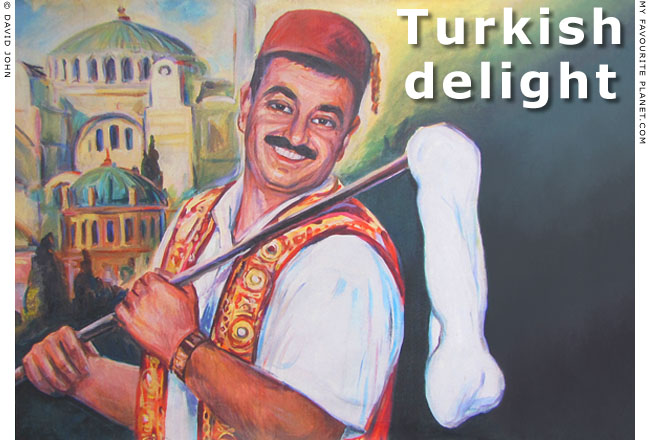 |
Edwin returns from a brief sojourn in the land of the divan. His queries
about the language and some other stuff lead to strange conclusions.
 |
“My English, she is more better now” ... my hat remains battered. It was caught by a wilful gust of exceptional strength while crossing the upper reaches of a small country disguised as a bus station. Buses being the prime mode of public and private transport in this large and far-flung nation, things connected with them tend to be over-dimensioned, except the seats, which are snug. Istanbul's Büyük Otogar * complex is closer to one of those confusing space-ports in Star Wars, where all kinds of ships arrive and depart in all directions, while oddly clad natives mill around in the foreground, than a bus station as we generally envisage one. To describe it as vast is to do it a disservice. To describe is as confusing is to indulge in criminal understatement. My hat was the least of my worries at the instant that it blew off. More pressing were the concerns of “where-the-hell-am-I” and “who-can-I-ask?” But scant seconds later, as I spied my headgear through a concrete shaft, laying in the middle of a sunken roadway some two stories below and about to be crushed by the first of five buses, my concerns centred wholly on its familiar Ecuadorian lines.
 Thanks to the tiny Eye of Fatima that a stranger had attached to the brim, and in which I now wholeheartedly believe (there is nothing like a miracle to achieve a quick conversion), the wind carefully puffed my Panama to the centre of the road, out of the way of the massive wheels, just as a kind official, who had witnessed the whole event, tapped me on the shoulder. He indicated that I should wait three minutes while he phoned a colleague. This colleague rescued my hat from almost certain abduction by a poor street-sweeper with a handcart and took some secret route up to return it to me, battered but useable, well within the given time.
 I felt embarrassed as I thanked the rescuers profusely; the hat is worthless to anyone but me. It has already travelled far too far, and it shows. In truth, it would have suited the street-sweeper better. If I mention this anecdote at all, it is to underline the extreme courtesy and friendliness of everyone who crossed my path during my all-too-brief sojourn among the “ottomen” and “ottowomen” of this hospitable land. Two persons of some importance in this echoing labyrinth, to judge by their uniforms, had taken the time to help a single tourist in very mild distress. The same would prove true of the heavily armed policemen in riot gear (what sort of riot they were expecting, I cannot imagine: a mass run on halva, a fight to the death with pistachio nuts?) who gave clear directions to my hotel, of the kind old man at the Sokulu Mosque who let me climb to the upper storey and even turned some extra lights on to help with my photography, of the hotel staff, whose natural warmth was such a welcome contrast to the exaggerated friendliness of the bazaar salesmen, of the people on the tram, so ready to point out landmarks and advise you when to get off, of the district police sergeant who shared his thermos of tea ...
 Someone on the plane had told me I might have difficulty finding enough people who speak English, and that Turkish was a whole world away from any familiar language. How wrong they proved to be! Not only could most people manage a little English, or at least a little German or French, but the Turkish language is also full of French and some English influences, rendering it quite approachable for the layman, despite its strange accents. A hotel is an “otel”. A hairdresser is a “koiför”. A cash exchange bank advertises its “deviz”, a tunnel is a “tünel” and a bus is an “otobus” when it’s not an “otokar”. Indeed, one begins to wonder what the Turks did with their sick people before they had an “ambulans” to put them in, how all those 600 concubines managed to rid themselves each week of the least trace of bodily hair before there was “epilasyon” to help them, where one caught the train before there was a “gar”, how one crossed the Bosporus before there was a “feribot”, what they ate in the park before the “piknik” was invented, what they strolled along before there was a “bulevard”, how anything stylish was conceived before the advent of “dizine”, what a new idea was before it became “orijinal”, where you ate prior to the arrival of the “kafeterya”, where you set up your desk before there was an “ofis” to go to, where you found relief before there were “tuvalets” – which can, by the way, be found in abundance in Istanbul, at every mosque and in most public squares, for men and women, all scrupulously clean, all well-equipped with soap, fresh water, paper and towels: a far cry from Brussels, which until recently boasted, if that is the right word, but one solitary public urinal for the entire city – and just what this country lived from before there was “turizm”. |
|
| |
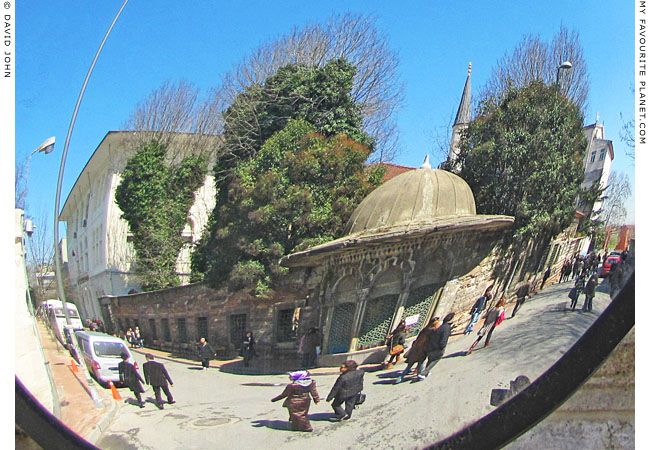

Istanbul University, Beyazit, Istanbul. |
| |
Long before Ataturk turned the nation’s gaze firmly westwards to invite those selfsame tourists in, something many Turks are quite understandably starting to regret, the Sultans were already keen to modernize their realm. They imported European art and values and endeavoured to make their country accessible and attractive for outside investment at a time when the income they received from their autocratic ownership of monopolies in spices, silks and ceramics was declining fast. This was a successful tactic, but unfortunately it led them into some bad decisions later on, one of which was a dodgy alliance with the wrong side in the First World War.
 Despite having had their bread well-buttered by a series of British monarchs (two of them were even inducted into the Order of the Garter, the Queen’s inner circle), the Sultans became enamoured of German power and Prussian state organization, just like the Japanese emperors of the same period, and with the same disastrous repercussions. It was in the nature of the Ottoman rulers to admire a well-run shop, rather than the heap of muddling meddlers that the English had turned out to be. After all, they had run a tight enough ship themselves for many centuries. But this fatal fascination with the Teutonic led them to be swept away along with those great houses of Europe, the Hapsburgs and the Prussians, the Bourbons and the Romanovs, the Esterhazys and the Sachs Gothas, whom they had so admired from a distance, but whose proximity proved so deadly.
 Et in arcadia ego Et in arcadia ego. It would appear that even mountains of Turkish delight cannot save you from a bad case of realpolitik when you import too much pragmatism into your magic carpet world full of eastern promise. The construction of the ingratiatingly European Dolmabahçe Palace marked the beginning of the end. “Choose your friends from among those who flatter you the least”, was a maxim of the Orient. The Sultans not only failed to follow their own rule of thumb, but were also caught off guard when others did.
© Edwin Drood, April 2012 |
|

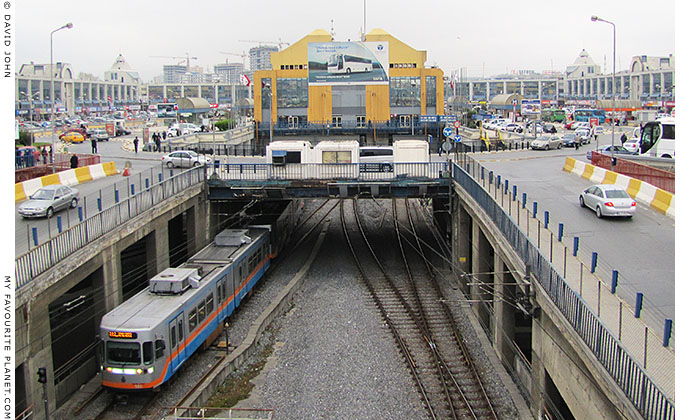

Büyük Otogar bus station, Istanbul, Turkey. The metro runs below the complex.
|
* Büyük Otogar, literally "the Grand Bus Station", also known as Esenler Otogar, is Istanbul's main national and international bus terminal. It is located in the Bayrampasa district, on the European side of the city, 10 km west of Sultanahmet Square. The complex has its own own mosque, metro station (the large yellow building in the centre of the photo above), with an indoor market which has stands selling clothes, shoes, toys, groceries and snacks.

The station consists of rows of modern low-rise buildings which house the offices of several bus companies offering services to various destinations. Discovering which companies run buses to which destinations is usually the first obstacle for visitors. Luckily, many people at the otogar speak English and/or German, and are very helpful. Buses arrive and depart from behind the buildings.

Many travel agents in the city centre are happy to provide information about long-distance buses, and some also sell bus tickets. The travel agency price is normally the same as at the bus station. |
|
| |
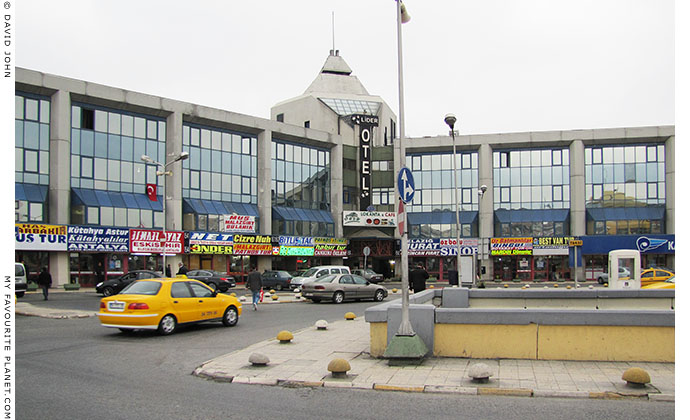

Bus company offices at Büyük Otogar. |
| |
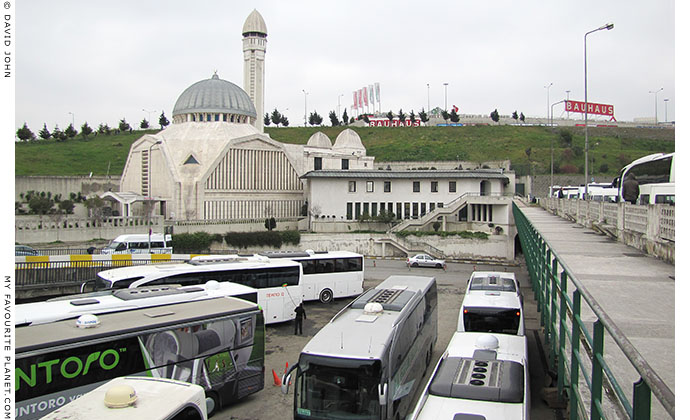

The modern concrete mosque at Büyük Otogar.

A good place to pray for a successful journey, give thanks for a safe arrival,
or just to seek a few moments of peace and quiet in transit. |
| |
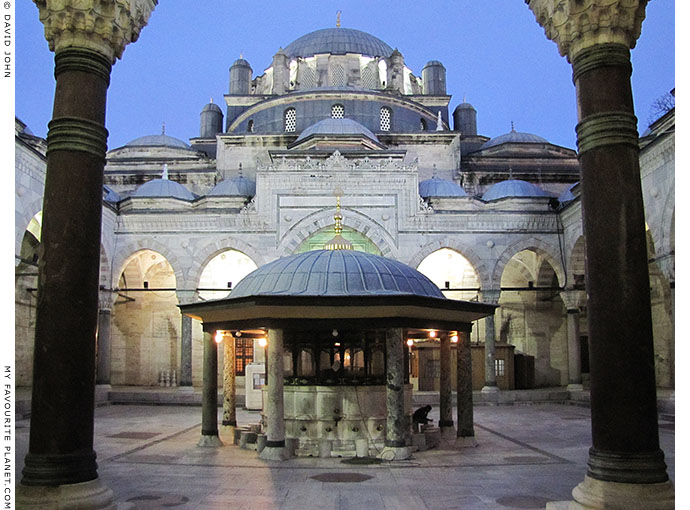

Courtyard of the Beyazit Camii mosque, Istanbul. Commissioned by Ottoman Sultan Bayezid II
and completed in 1506, it is the oldest surviving imperial mosque in the city. |
Edwin Drood's Column, the blog by The Mysterious Edwin Drood,

at My Favourite Planet Blogs.
We welcome all considerate responses to this article
and all other blogs on My Favourite Planet.
Please get in contact. |
 |
Visit the My Favourite Planet Group on Facebook.

Join the group, write a message or comment,
post photos and videos, start a discussion... |
|
Views of blog authors do not necessarily reflect those of the publishers
or anyone else at, on or in the vicinity of My Favourite Planet. |
 |
 |
|
|
| |
| |
|
| |
 |
| |
 |
| |
 |
| |

George Alvanos

rooms
in Kavala's historic Panagia District

Anthemiou 35,
Kavala, Greece

kavalarooms.gr
 |
| |

Olive Garden Restaurant

Kastellorizo, Greece

+30 22460 49 109

kastellorizo.de
 |
| |

Papoutsis
Travel Agency

Kastellorizo, Greece

+30 22460 49 286

greeklodgings.gr
 |
| |
|